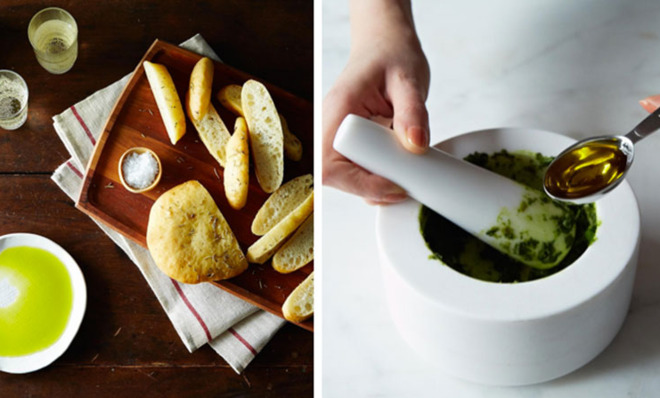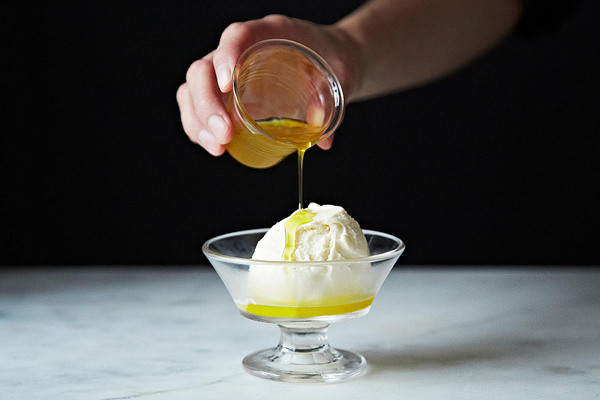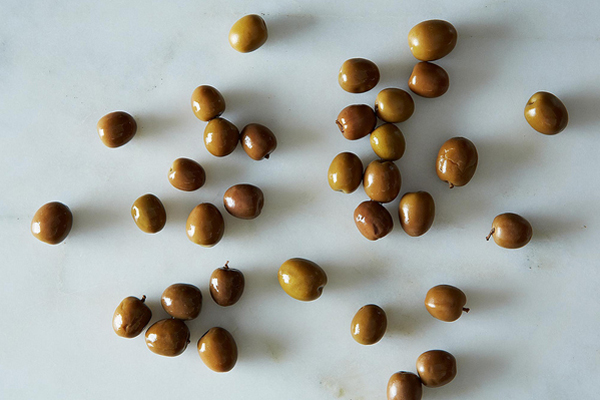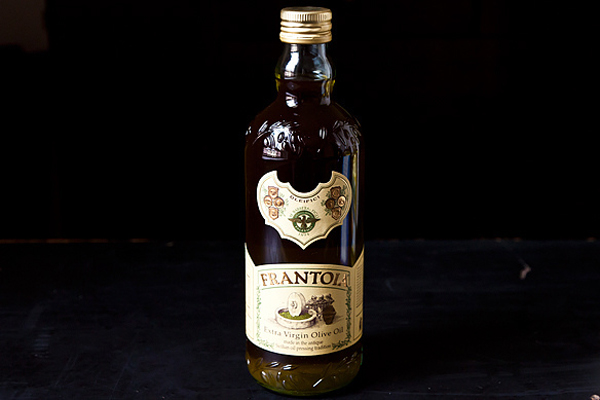Uncovering the truth about olive oil
Let's debunk some common myths

A free daily email with the biggest news stories of the day – and the best features from TheWeek.com
You are now subscribed
Your newsletter sign-up was successful

Extra-virgin olive oil is a pantry staple: We whisk it into our viniagrettes, use it to fry our eggs, and bake it into our cakes. But while our kitchen wouldn't be complete without a bottle or two, the information about this essential ingredient can be conflicting — and answers can be hard to track down. Can you fry with it? How should you store it? How do you know which bottle to buy among a whole shelf of options?
When faced with all these questions, it's best to turn to an expert — and our friend Nancy Harmon Jenkins is exactly that. In between harvesting her own olives on her farm in Tuscany, she's preparing for the release of her new book, Virgin Territory, which digs deep into the world of olive oil: how to buy, store, and cook with it. We were lucky enough to sit down with Nancy at Food52 HQ to debunk some common myths and taste some of her favorite olive oils. Here's what she had to say about choosing, storing, and cooking with extra-virgin olive oil:

What are the most common misconceptions about olive oil?
The Week
Escape your echo chamber. Get the facts behind the news, plus analysis from multiple perspectives.

Sign up for The Week's Free Newsletters
From our morning news briefing to a weekly Good News Newsletter, get the best of The Week delivered directly to your inbox.
From our morning news briefing to a weekly Good News Newsletter, get the best of The Week delivered directly to your inbox.
The biggest misconception is that you can't cook with extra-virgin olive oil, that it has too high a smoke point. (The smoke point is the point at which an oil — any oil — when heated starts to smoke and break down into glycerol and free fatty acids. Not only does a smoking oil or fat give food an unpleasant taste, but there is also a good deal of evidence that consuming such fats on a regular basis is a very unhealthy practice.) But, according to the International Olive Council (IOC), extra-virgin olive oil has a smoke point of 400° F (210° C). Other experts say the smoke point is between 380° and 410° F, depending on the free acid level and the number of impurities (filtered oil is better for frying than unfiltered). Is that temperature low? I don't think so. The Joy of Cooking recommends deep-fat frying at between 350° and 365° F.
Obviously, I'm not recommending a fine estate-bottled extra-virgin for frying, any more than I would recommend a Romanée-Conti or something similar for your boeuf bourguignon. But a good, all-purpose, honestly made extra-virgin is perfect.
How can I tell if my olive oil is any good?
A great question and a difficult one. The best place to start is with the label. Look for a harvest date or a use-by date; the harvest date should be any time within the last two years but the closer to the present, the better, simply because the best oil is always the freshest. A use-by date is a bit tricky as it is usually 18 months from the bottling date and the oil might already be a couple of years old at the time of bottling. Also on the label, look for certain indications, like a DOC or IGT seal — that's Italian for Denomination of Controlled Origin or Typical of the Geographical Location. (In Spanish and French these come out with slightly different acronyms, but they all are controls of the quality of the oil.)
A free daily email with the biggest news stories of the day – and the best features from TheWeek.com
The biggest problem, however, comes from the way the oil is handled. The finest olive oil in the world will not stand up to a blast of heat or sunlight and all too often on the retail end, that's exactly what it may be subjected to. Actually, the best way to tell if your olive oil is any good is by taste and aroma — but that can lead to expensive mistakes. Most of all, I think you should find a supplier that you can trust, one who will take back or replace defective oil.

How do I find the best olive oil at my supermarket?
A hard question. Most supermarkets know absolutely nothing about extra-virgin olive oil, not about sourcing it and not about taking care of it in the shop. I would not recommend buying olive oil from a supermarket, even from a national chain (I won't mentioned any names). Instead, go to mail order and internet resources — Gustiamo, Market Hall Foods, Zingerman's, Di Paolo Selects, Corti Brothers, Olio2go, and some others. (Nancy is also a fan of this First Day Press Spanish Olive Oil.) Most of these internet suppliers also have retail outlets (Gustiamo is the one exception) where you can usually find a range of olive oils to taste. Use that opportunity to educate yourself about all the different flavors of olive oil, then make your selection.
How long will my olive oil keep for? Where and how should I store it?
If olive oil is well maintained, in a cool, dark place, it should keep for up to two years from harvest. Olive oil begins to degrade from the moment it is made and loses its brightness, its complexity, and its intensity as it ages. That said, however, old olive oil isn't necessarily bad. On our Tuscan farm, we use last year's olive oil for cooking, this year's oil for garnishing. I once fried a Thanksgiving turkey in four-year-old olive oil and we all agreed it was the best turkey we'd ever had.
Keep olive oil in a cool, dark cupboard, preferably in an unheated pantry, and just bring out a small amount to keep on the counter for cooking and garnishing. If you find a bargain in olive oil, say a 5-liter tin, that's fine, but rack off just a couple of cups at a time and keep the tin closed up — and always in that cool, dark place. Not the refrigerator, because condensation will occur and water droplets will fall into the oil and induce mold and rancidity.
What shouldn't I use olive oil for?
Despite what some people think, don't use it to rinse your hair. And don't use it to poach quenelles de brochet. I'm being silly but honestly, just about anywhere that you can use butter, lard, or bacon fat is a good place to think about olive oil. I have Chinese friends who have switched to olive oil for stir-frying even though Grace Young disagrees. I use the very finest extra-virgin olive oil as a garnish on a baked potato, or dribbled over a piece of hot toast that is then topped with a tomato slice or Greek yogurt or a wedge of avocado — or all three — for a great breakfast sandwich.

What are some other resources where people can learn more about olive oil?
One very good book, Extra Virginity, was written by my colleague Tom Mueller, but it might make you swear off olive oil entirely and I wouldn't want that to happen. Tom talks at great length about the criminal side of olive oil — but, as a quick look at the USDA web site will confirm, many foods are wide open to fraud and criminal behavior. Another great book, though it's a bit dated, is Olives: The Life and Lore of a Noble Fruit by Mort Rosenblum who makes his own oil in Provence.
Apart from books, pay a visit to any of the retail outlets I mentioned above where there is almost always an opportunity to taste a variety of olive oils. And go to California during the olive harvest (November through December) to experience the excitement and taste oil fresh off the press. (Or come to Italy with me!) It is such an incredible flavor that it will convince you like nothing else that this is a rare and misunderstood ingredient, as worthy of respect and awe as caviar or white truffles.
What got you so interested in olive oil?
Living in and around the Mediterranean for about 15 years — Spain, southern France, Lebanon, Cyprus, and finally Italy — I began to understand what an important ingredient it is. The history had me hooked, too — olive oil has been produced in the Mediterranean countries for many thousands of years, and was a vital trade product throughout that time. And then, when I started studying the Mediterranean Diet, back in the early 90s, and realized what an important function olive oil has in the positive health outcomes in Mediterranean cultures, it became even more important to me. It is still the keystone of the diet and it almost seems that not a day goes by, or a week at least, without some new revelation being published about how critical extra-virgin olive oil is in combatting all sorts of lifestyle diseases, from Alzheimer's to cancer to diabetes.
This story was originally published on Food52.com: Uncovering the truth about olive oil with Nancy Harmon Jenkins
More from Food52...
-
 The Week Unwrapped: Do the Freemasons have too much sway in the police force?
The Week Unwrapped: Do the Freemasons have too much sway in the police force?Podcast Plus, what does the growing popularity of prediction markets mean for the future? And why are UK film and TV workers struggling?
-
 Properties of the week: pretty thatched cottages
Properties of the week: pretty thatched cottagesThe Week Recommends Featuring homes in West Sussex, Dorset and Suffolk
-
 The week’s best photos
The week’s best photosIn Pictures An explosive meal, a carnival of joy, and more